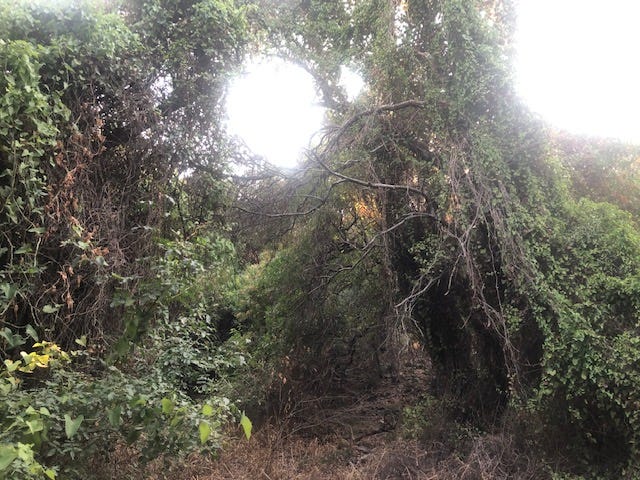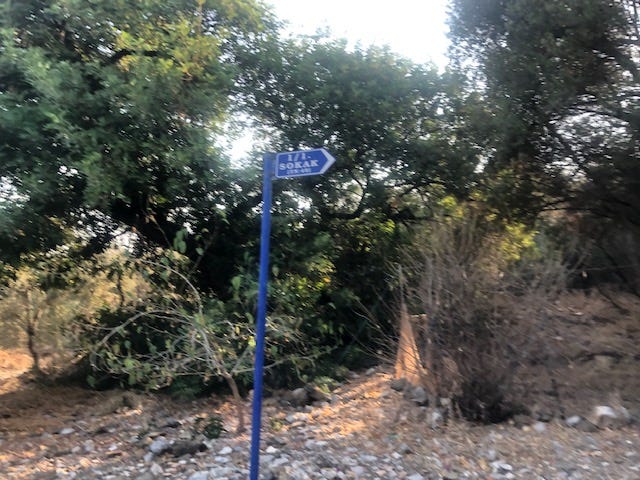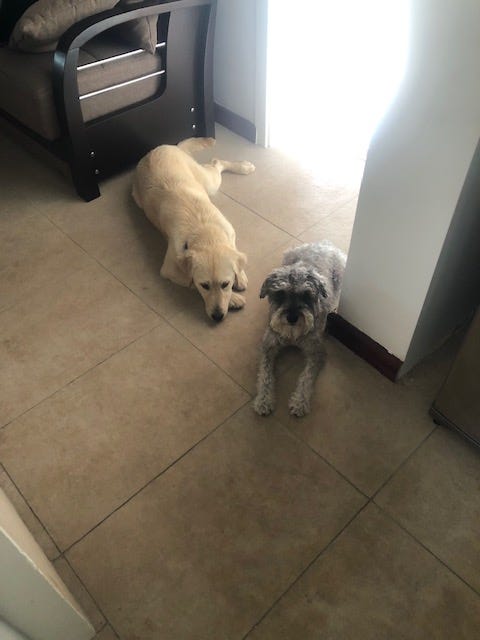I am in a house on a tiny island with no cars and one road.
I know. It’s ridiculous, and I am stupidly lucky. Especially as I’ve come here many times before. When I do a guided meditation and the voice tells me to “imagine a safe place”, this is the one I bring to mind.
I’m here for two weeks, and I’ve brought the poet.
I was nervous about spending so long with him (or anyone) in a place that doesn’t have so much as a general store. Plus, we had not had an easy time of it lately. We are both stubborn, both fighters, both extremely fond of being right. Sometimes we are aware of this. But we’ve been locked horns on enough occasions lately to make us both question whether we want to continue the relationship.
The first week is idyllic. I’m still on holiday from work, so while he spends mornings or afternoons in front of his laptop, I swim, eat, nap, read and repeat. I feel fed here, like I plug myself into the earth of this place, and its minerals and magic pump life and hope back into my being.
The poet is a swimmer, like me. He’s a great cook, unlike me. Flying here from Istanbul, with Django and my giant suitcase in the scorching heat amped up by hot flashes (mine, not his), I observe how he easily he navigates situations that cause me instant anxiety. How quickly he makes people—taxi drivers, fellow passengers—comfortable. He finds bus stops. He keeps us hydrated. He gently brings me back to reality when I drift off into dreamland and forget my passport at a service counter. On the island, I watch him appreciate this place as much as I do, diving into its waters, soaking up its dusks and dawns, inhaling its quiet.
And then, on the 8th day, we lock horns again.
I don’t remember how it starts. We practice something we’ve been trying to learn: stopping and making sure we both understand what the other is actually saying, as opposed to how they may sound, as things easily get lost in translation when one member of a party has to speak a second language, and the other member is (cough) maybe slightly sensitive and somewhat reactive. We cool off for a bit, but it starts up again.
I notice, too, that I am picking at him.
This is a very attractive quality of mine. I decide what perfection is and how can be achieved, then have a go at my partner when he doesn’t meet my impossible standards. I need him to listen differently, explain things better, eat more salad. I know this does not paint me in the best of lights. And the crux of it is my complete conviction that if the other person would just do things my way, everything between us would be alright.
“Sometimes I feel like nothing I’m doing is good enough,” he tells me, on an evening swim.
Imagine that.
On our second last night on the island, we pack mugs and wine and towels and a pool noodle and head to the beach to watch the sunset. We are joined partway by a dog Django has befriended recently. We think her name is Chico. She’s not a stray, but has clearly not been trained, and she leaps all over us, biting the noodle, grabbing at skin as she nips at the towels, jumping up onto our chests, gnawing on Django’s leash. We try all the tricks you learn dealing with street dogs in Turkey - yelling, making ourselves big, running at her, finally, guiltily, pretending to throw something at her. But she’s so fearless, nothing works.
“This dog is being abused by someone,” the poet observes. “A lot.”
Chico zooms around us in circles, splashing sand into our drinks and trying to crawl into our laps, even though she’s the size of an 8-year old child.
We manage to shake her off by taking Django back home, and then lie on our towels by the water until late into the night, talking, trying to make things right again.
The next morning, Chico is waiting for us at the beach. The poet goes straight up to her.
“I am so sorry,” he says, scratching her behind her ears. “I shouldn’t have yelled at you. You didn’t deserve that.”
It is these kinds of moments that remind me how much of a jerk I truly am.
I give her a cuddle and repeat his sentiments. She pads into the water with us, swimming alongside us and putting her paws on our shoulders. I carry her as if she’s a little dog and she curls into me, nuzzling her head into my neck, her eyes closed, refusing to budge until the poet takes her and holds her in the same way. She follows us home and plays with Django in the garden for hours, the two of them leaping around like little wrestlers until they’re panting and exhausted.
Sometimes, I can see how I’ve gotten here.
I can see how, when I’m being hard on someone close to me, it’s because I’m being hard on myself. I’m in pain, and I’m blaming myself for it, and I’m trying to control someone else because I don’t want to feel my own shitty feelings caused by my shitty, perfectionist thoughts.
“You’ve done it wrong again.”
“You shouldn’t be doing this. You’re obviously not ready for a relationship.”
“Look at this beautiful place you’re in. How could you find anything wrong with this life? How can you be so negative?”
“You have failed once more. Congratulations.”
Sometimes, seeing it is all I need. I can stop, get quiet, feel my feelings, and apologize to everyone involved.
Other times, I barge ahead stubbornly, blindly convinced that if I just get it all right, I will win at life.
I read recently that when someone triggers you, no matter how much you love them, you turn them into the enemy.
On our last night, Chico joins us for an evening drink at one of the island’s two restaurants. The staff know her, and explain that her name is actually Cilek, which is Turkish for “strawberry”. (Chico is another island dog, similar in colouring.) Cilek is relatively well-behaved, sitting quietly with us until we leave. That’s when she starts leaping on us again. I can see the teeth-marks she’s leaving on Django’s leash.
“We’ll call her owner,” our waiter says, apologetically.
She trots back towards home with us. A burly man with a pot belly appears, and she runs to him. He picks Cilek up by the scruff of her neck and hurls her onto the ground.
I stand, gasping, frozen.
The poet nods, sadly.
“I want to take Cilek back with us,” I announce, when we get home.
“Yup,” the poet says. “I thought the same thing.”
We discuss whether we should just take her quietly, or offer her owner money, and what will happen if someone sees us sneak off with her. We decide it doesn’t matter. Nothing matters except keeping Cilek safe and giving her a happy life.
At midnight, we head out determinedly to find her. We trudge in the darkness through brambles and dry scrub, quietly whistling for her, almost unleashing the wrong dog. Finally, we give up and head home. Twenty minutes later, she shows up in our backyard.
We bring her inside, and she sleeps like a baby in the cool of the air-conditioning. The next morning, she joins us at the beach again, snuggling so lovingly in our arms in the water that I almost can’t bear it. We watch her tear across the beach with the real Chico, disappearing into the trees and reappearing again. I wonder if she’s ever seen a car in her life, or known a curfew, or had to stay within the walls of a garden.
“What do we do?” I ask the poet.
Which one is a better life for her?
Would she prefer love to freedom?
Who are we to decide?
The poet suggests that if she doesn’t come to us when we leave the island, we won’t bring her with us.
“For now,” he adds. “We can always come back for her.”
We don’t see her again.
Back on the mainland, by the mediterranean, under the palm trees, I feel like the most privileged person on earth for missing being somewhere else.
I chastise myself for not being happier, for not being more in love, for needing so much space, for having eaten so much ice cream. We unpack our things in a borrowed 1-bedroom apartment, and I grow quieter and more withdrawn. The poet feels it and reacts, and off we go. A few nights after we’ve returned, I snap—not at him, but at the situation.
“I can’t do this anymore,” I say. “I can’t keep fighting. I can’t keep feeling like I’m hurting you, and I can’t keep being this horrible to myself.”
“Why are you being horrible to yourself?” he asks. “Why can’t you stop?”
I try to explain that this is how I’m wired. That I am trying to change, but it’s not something I can just snap my fingers and make happen.
We stay up until the wee hours, trying to talk it out, crying and hugging each other. I wake the next morning after 4 hours sleep, so sad at the thought of losing him it feels like my heart is crumbling in on itself.
But I know that, even more than I need him, I need peace. I need to accept what I am and am not ready for.
I ask him not to leave just yet.
We make breakfast.
We keep talking. Without my perceived shackles of partnerhood, I am radically honest. I explain how much being in relationship with someone heightens my self-judgment. How afraid I get, and how I take that fear out on him.
We make dinner. Then breakfast. This goes on for days.
We are laughing again. The arguing all but stops. Without the pressure I’ve been putting on myself, I don’t feel the need to pull away from him, and he doesn’t feel the need to ask where I’ve gone.
I don’t know what’s going to happen. I’m learning how important it is to name and be honest about what I cannot give someone, and not to shame myself if that doesn’t measure up to some Hollywood or Hallmark standard. There is so little space for the trauma we carry into relationships, especially as we get older. When did love get so binary?
I am trying to recognize that what I want the most freedom from is actually from my own mind. That when I love myself, even when I want my freedom, I get real freedom, and I can love more and better. That when I feel this way, the thing that helps the least is to yell and beat up on my inner child.
The thing that helps the most is wrapping my arms around my scared self, and carrying her, gently and forgivingly, in the sea.







❤️❤️❤️❤️❤️❤️❤️❤️🥰🥰🥰🥰🥰🥰❤️❤️🥰🥰❤️🥰❤️